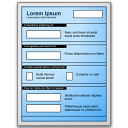The Department is aware of recurring errors with ACFI claims involving ‘agitation’. If you are looking to make this claim for a resident it is important that you note the following:
– When making claims in ACFI 8 (verbal behaviour) and ACFI 9 (physical behaviour) you should refer to page 44 of the ACFI User Guide for a clear description of the behavioural symptoms.
– If the assessed care need of the ‘agitated’ behaviour is as a symptom of depression it should be scored in the Cornell Scale for Depression (CSD) and claimed in ACFI 10 (Depression), not ACFI 8 and/or ACFI 9.
– If these behaviours are not related to depression, claims should be made against ACFI 8 and 9.
The ACFI User Guide can be accessed from the department’s website.






